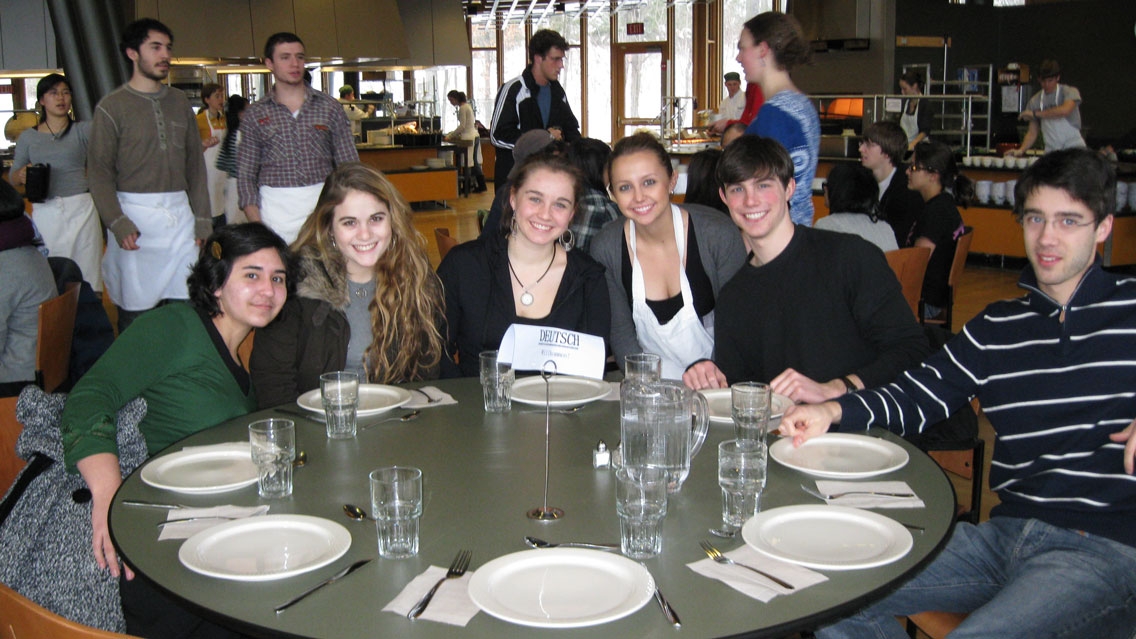Resources
Middlebury boasts a rich variety of resources and activities for the study of German.
In addition to its extensive collection of books, the Davis Library has many current German periodicals as well as German films and music.
For anyone on campus during the summer, the German School provides a continuous offering of lectures, plays, concerts, films, and sporting events in German.
And, of course, the many German-speaking visitors to campus and speakers of German at the College and elsewhere in Vermont give our students an excellent opportunity to practice their language skills before studying in Germany and to keep them fresh after their return.

Language Tables
Currently housed in the Redfield Proctor dining hall, the language tables offer students a place to speak and listen together over lunch. The German table is a very popular place to meet students who have just returned from abroad or have other great stories to tell, or to chat with the German assistant and German professors to practice German with a native speaker! Guten Appetit!
For Future Teachers
Students who wish to be certified as teachers of German should plan to take GRMN 0304, GRMN 0310, GRMN 0330, and GRMN 0334 and should consult the requirements for certification described in the Education Studies Program pages.
Forms
The worksheet below is designed to help German majors plan their academic programs and track their progress toward completion:
Library and Technology
- Research by subject: German—Start your research here.
- Library—Location, contacts, and collection description for the library.
- Technology Support—Help documents and contacts.
- Library Liaison—Have a question about research? Ask your liaison. The German liaison is Bryan Carson, reference and instruction librarian, 802-546-0054, bcarson@middlebury.edu
Frequently Asked Questions
What do the various course numbers stand for?
Our 100 sequence (101 in the fall, 102 during J-term, and 103 in the spring) is geared toward quick and early proficiency in comprehension and free expression. Grammatical structures are practiced through group activities and situational exercises (e.g., role-playing games and partner interviews). German 101 is designed for students with no previous experience with German. Most of our students start taking German in their first year, but any student is welcome to take 101 at any point in their college career. Please note: 101 is only offered in the fall! Upon completion of German 103, most students achieve a solid A2 or B1 level.
German 200 (201 is only offered in the fall and 202 only in the spring) is our culture-based intermediate language sequence that focuses students’ attention on intercultural aspects of language acquisition, vocabulary expansion, reading and writing strategies, and a review of grammar. It moves from a focus on issues of individual identity and personal experiences to a discussion of Germany today; explores national identity in Germany, Austria, and Switzerland; and supplies an overview of cultural history, literary achievements, and philosophical traditions in the German-speaking world. Students learn how to succinctly and fluently express their own viewpoints. At the end of 202, they should have achieved a solid B1 or B2 level.
Both 300 and 400 level courses count as “upper level” courses: they are content courses solely taught in German. While the 300 level courses provide larger contexts or overviews pertaining to the German speaking world (German Linguistics, German in Its Cultural Contexts, 1871–1990, Rethinking Literature), the 400 level courses discuss a certain era or topic in depth (Exiles, Refugees, Migrants, Germany Today, Fin de Siècle Vienna, Rereading Fairytales, Contemporary Germany and Sustainability, The Weimar Republic).
I am interested in becoming a German minor. What do I have to do?
The German minor consists of a sequence of five courses, taught in German, starting at or above the 200 level. At least three of those courses must be at the 300 level or higher, and at least three of the five required courses have to be taken during the regular academic year at Middlebury College—for example, 201, 202, and three upper-level courses in German. A student can combine the department’s offerings with courses taken at the Middlebury summer school.
How many courses do I have to take to complete a major in German?
Students are required to complete eight courses in German, above GRMN 0299. Where appropriate, one course may be taken in English. We ask students to consult the department chair to make sure a course outside of our department’s offerings can be taken as a German major credit.
Among the courses taught in English that may be taken as a German major credit are the following:
- Black German History [BLST 0261]
- Blood and Iron: 19th-Century Germany (HIST 0249]
- Faust’s Metropolis: Berlin [HARC 0341]
- Literary Responses to the Holocaust [CMLT/GRMN 0310]
I am a first-year student in German 101 right now. Can I go abroad next year?
Not quite yet. In order to study in Mainz, Berlin, or Potsdam, students have to have junior standing. They are also required to take at least two upper-level courses in German prior to studying abroad. We strongly recommend that one of these courses is GRMN 0350: Advanced Writing Workshop (taught each fall). Check this site out: http://schoolingermany.middcreate.net/
Do I have to major in German to study abroad?
No. Many students who major in other disciplines take language, culture, and literature classes with us and study abroad in Germany in their junior year. In recent years, we had students in biology, geology, history, history of art and architecture, international and global studies, economics, and many more who studied in Mainz, Berlin, or Potsdam. While students don’t HAVE to major in German to study abroad, they will in most cases have accrued enough German credits to declare a minor.
